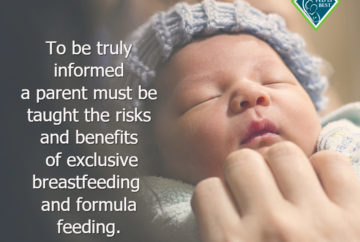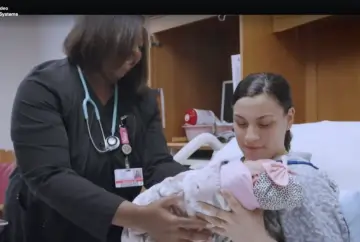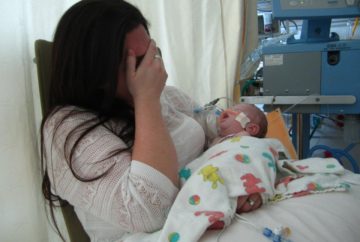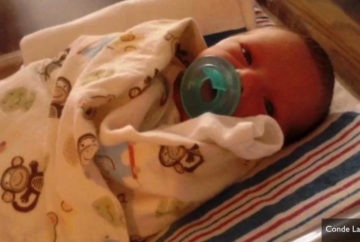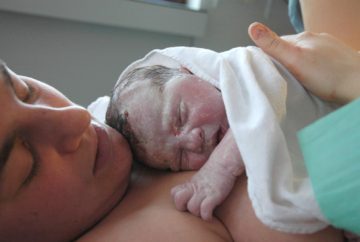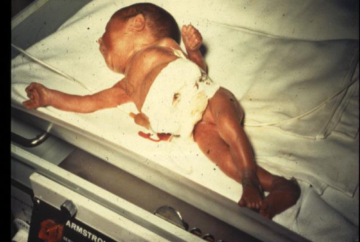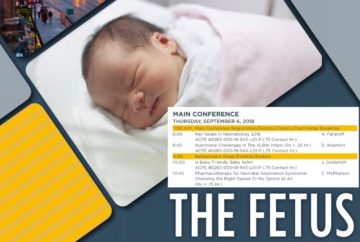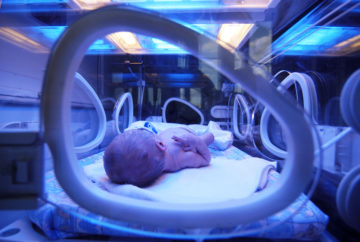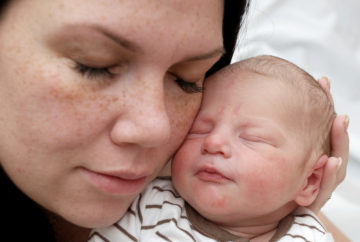Information for Hospitals: Ensuring Safety for Breastfed Newborns
RE: Newborn Patient Safety Issues due to the Baby-Friendly Hospital Initiative
The Fed is Best Foundation (fedisbest.org) is a national non-profit organization dedicated to promoting safe breastfeeding practices and policies. We do this by providing families and health professionals peer-reviewed evidenced-based education on infant nutritional requirements, breastfeeding, and how to prevent serious complications of insufficient feeding, namely excessive jaundice, dehydration, and hypoglycemia. These conditions have increased as a result of the push to increase exclusive breastfeeding rates before hospital discharge in combination with high rates of insufficient breast milk production and can cause serious preventable infant brain injury, permanent disability, and liability for health professionals and hospitals.
Our organization is followed by over 800K people across the globe and includes more than 1500 patient advocates, including physicians, mother-baby/NICU nurses, and lactation professionals who have witnessed an acceleration of extended and repeat newborn admissions for these brain-threatening complications as a result of the controversial restrictive breastfeeding protocol known as the Baby-Friendly Hospital Initiative (BFHI). Reports of these negative outcomes of the BFHI have gained increasing media attention. Often, they result from health professionals being pressured to ignore signs of infant distress from insufficient milk intake, namely prolonged crying and nursing, in order to avoid formula supplementation and meet the required BFHI hospital quality metric. As a result, previously healthy newborns have become critically ill and even permanently disabled from severe jaundice, hypernatremia, and hypoglycemia. Exclusive breastfeeding is now the leading risk factor for newborn readmission, which increases the risk by 2- to 11-fold. Recent studies show that 1 in 71 to 1 in 25 exclusively breastfed newborns are readmitted for feeding complications, 1 in 17 requiring phototherapy for jaundice. We have submitted a detailed summary of the complications associated with the BFHI policies to the 2020 USDA Dietary Guidelines Committee.
We have received and studied thousands of stories of breastfeeding tragedies sent to us by families, including the widely-publicized story of Landon Johnson, who developed cardiac arrest from hypernatremic dehydration 12 hours after being discharged from a California Baby-Friendly hospital. Similarly, high-profile cases of in-hospital infant suffocation have resulted from accidental bed-sharing by sleep-deprived parents who were pressured to room in 24 hours while breastfeeding and doing unsupervised skin-to-skin care, also known as Sudden Unexpected Postnatal Collapse. SUPC is a known complication of the Baby-Friendly initiative and is now the topic of an AAP Safe Sleep Policy. Furthermore, a U.S. population-based study recently published in Journal of Pediatrics has now shown that BFHI hospital certification has in fact not increased national breastfeeding initiation and sustained breastfeeding rates, which we discuss in this article.
We have created this webpage to help inform you of these complications. We ask you to examine your breastfeeding policies to see how many newborns in your hospital are requiring admission for dehydration, hypoglycemia, and jaundice due to insufficient intake while exclusively breastfeeding. We ask you to facilitate breastfeeding through responsible and respectful patient education in breastfeeding techniques without rigid insistence on compliance with ineffective and even harmful BFHI policies. If you are BFHI-certified, we ask you to suspend your certification, particularly the policies that have been shown to cause the most harm, namely:
- the >80% exclusive breastfeeding at discharge metric
- requiring physician prescriptions for supplementation, particularly in infants showing persistent hunger signs
- unsupervised, prolonged skin-to-skin care
- the ban on pacifiers (which has been abandoned by the 2017 WHO guidelines due to its effects on SIDS rates)
- the forced 24-hour rooming-in policy along with nursery closure, and
- misleading patient education on the size of the newborn stomach, cluster-feeding, rarity of insufficient breast milk, and risks of formula without education on the risk of starvation-related complications while exclusively breastfeeding with insufficient milk intake.
Additionally, we would like to offer your facility guidance on how to provide safe breastfeeding support to prevent these complications and improve patient outcomes and satisfaction. We are available to meet by video conference or phone to answer questions, provide recommendations, or help you develop your safe infant feeding program similar to programs like the Rush Family Friendly Initiative. Please contact us by email at contact@fedisbest.org for more information.
We thank you for your dedication to patient safety and quality improvement.
Sincerely,
Christie del Castillo-Hegyi, M.D.
Emergency Physician, Co-Founder, Fed is Best Foundation
Newborn/NICU Nurse, Infant Feeding/Lactation Consultant, Co-Founder, Fed is Best Foundation
Fed is Best Foundation is a registered 501(c)3 non-profit organization with a strict policy of not accepting any funds or donations from organizations or companies that obtain revenue from infant feeding products or services, both breast- and formula-feeding. Our funding comes from families and health professional supporters of the Fed is Best Mission. We do this in order to provide parents and health professionals unbiased and safe infant feeding advice.
Second Night Syndrome: Complications in Exclusively Breastfed Newborns
Complication of insufficient feeding in exclusively breastfed newborns, like hyperbilirubinemia and hypoglycemia are common. The early signs of those complications are frequent or constant crying and prolonged or unsatisfied nursing (where baby latches and unlatches in response to insufficient milk at the breast). These signs are also called the Second Night Syndrome, which put an infant … Continue reading Second Night Syndrome: Complications in Exclusively Breastfed Newborns
Informed Consent Regarding Risks of Insufficient Feeding
The most important duty of hospitals and health professionals is to respect patient autonomy and ensure patient safety. One of the most important ways health professionals and hospitals preserve patient autonomy and safety is to provide them all the information required to make safe decisions regarding their infant’s health. Complications related to insufficient feeding of … Continue reading Informed Consent Regarding Risks of Insufficient Feeding
Rush Family-Friendly Initiative: A New Alternative to In-Hospital Infant Feeding Support
We are proud to introduce the Rush Family-Friendly Initiative! A new alternative to hospital newborn infant feeding support Respectful, judgment-free support of exclusive breastfeeding, supplemented breastfeeding and exclusive bottle-feeding before and after birth Prenatal education and lactation support Support of safe skin-to-skin care, rooming-in with nurseries available on demand Complete patient education on all infant … Continue reading Rush Family-Friendly Initiative: A New Alternative to In-Hospital Infant Feeding Support
U.S. Study Shows Baby-Friendly Hospital Initiative Does Not Work
On October 14, 2019, the Journal of Pediatrics published astonishing findings regarding the effects of the Baby-Friendly hospital certification on sustained breastfeeding rates as defined by the 2020 Healthy People Goals of: any breastfeeding at 6 and 12 months exclusive breastfeeding at 3 and 6 months. “Baby-Friendly designation did not demonstrate a significant association with … Continue reading U.S. Study Shows Baby-Friendly Hospital Initiative Does Not Work
Fed is Best Statement to the USDA Regarding the Harms of the Baby-Friendly Hospital Initiative
The USDA Dietary Guidelines Advisory Committee has reconvened to update the national dietary guidelines. This year, they are creating guidelines during pregnancy and lactation as well as from birth to 24 months. Dr. Christie del Castillo-Hegyi and Jillian Johnson of the Fed is Best Foundation travelled to Washington, D.C. and spoke to the committee on … Continue reading Fed is Best Statement to the USDA Regarding the Harms of the Baby-Friendly Hospital Initiative
Complications from the Baby-Friendly Protocol
The Fed is Best Foundation has received tens of thousands of stories from mothers whose children have suffered serious starvation-related complications while exclusively breastfeeding with insufficient breast milk. The most common reasons mothers cite for these complications were failures by their health providers and health educators to teach them about: the signs of insufficient feeding … Continue reading Complications from the Baby-Friendly Protocol
Baby-Friendly Protocol Complications in the Media
Serious complications associated with strict adherence to the Baby-Friendly Hospital Intiative and the WHO Ten Steps to Successful Breastfeeding have led to preventable hospitalizations for jaundice, dehydration and hypoglycemia, known causes of impaired brain development. Some hospitals have seen deaths and near-deaths due to suffocation from accidental bed sharing, called Sudden Unexpected Postnatal Collapse. These … Continue reading Baby-Friendly Protocol Complications in the Media
Pediatrician and Other Physician Views on the Baby-Friendly Hospital Initiative
Pediatricians and other physicians are publishing and presenting their views about the ethical problems and safety issues of the Baby-Friendly Hospital Initiative and the World Health Organization breastfeeding policies in news media, peer-reviewed journals and national pediatric conferences. Here are a few examples.
Starvation Jaundice and Brain Injury in Underfed Breastfed Newborns
Lecture Delivered by Dr. Lawrence Gartner, Director of Baby-Friendly USA This is a lecture provided to lactation consultants at a prominent breastfeeding conference given by Baby-Friendly USA Director, Dr. Lawrence Gartner, who discussed the risk of brain injury from starvation-related jaundice, called kernicterus, 90% of which occurs to breastfed babies who lose excessive weight, according … Continue reading Starvation Jaundice and Brain Injury in Underfed Breastfed Newborns
Dangers of Insufficient Exclusive Breastfeeding Grand Rounds Presentation
Santa Fe, New Mexico—On May 2-3, 2018, Dr. Christie del Castillo-Hegyi, Co-Founder of the Fed is Best Foundation had the honor of giving the following presentation to the largest hospital in Santa Fe, NM, CHRISTUS St. Vincent whose safety and quality improvement program is leading the way toward optimizing newborn breastfeeding support. The Grand Rounds conference was held … Continue reading Dangers of Insufficient Exclusive Breastfeeding Grand Rounds Presentation
“Is Baby-Friendly Safe?”: BFHI Safety Issues Discussed at National Neonatology Conference
Las Vegas, Nevada — On September 6, 2018, the national neonatology conference, “The Fetus and Newborn Conference” was held in Las Vegas, Nevada. Among the speakers was Jay Goldsmith, M.D., Neonatologist and Professor of Pediatrics at Tulane University, Member of the American Academy of Pediatrics Section on the Fetus and Newborn who gave a talk … Continue reading “Is Baby-Friendly Safe?”: BFHI Safety Issues Discussed at National Neonatology Conference
Neonatal Nurse Practitioner Speaks Out About Dangerous Practices of the BFHI
The most common encounters that I see with exclusively breastfed babies during their hospital stay are the complications of not receiving enough colostrum. It is very common to hear frantically crying babies on the mother-baby units because they are hungry and are not satisfied from breastfeeding. This happens every single shift I work. Mothers are … Continue reading Neonatal Nurse Practitioner Speaks Out About Dangerous Practices of the BFHI
Open Letter to Obstetric Care Providers and Health Facilities on the Importance of Safe Infant Feeding
Dear Obstetrician-Gynecologist, Family Practitioner, Midwife or Health Administrator, I am writing to you as a mother and advocate for Fed is Best. You may have seen the story of Landon Johnson, who was welcomed into the world by his parents in February 2012. Like most new parents, Landon’s mom and dad were lead to believe … Continue reading Open Letter to Obstetric Care Providers and Health Facilities on the Importance of Safe Infant Feeding
Fed is Best Foundation Clinical Guidelines for Safe Breastfeeding Support in the Newborn Period
The Fed is Best Clinical Guidelines for Safe Breastfeeding Support in the Newborn Period the Fed is Best Foundation October 20, 2018 The mission of the Fed is Best Foundation is to provide safe, evidence-based education and clinical guidelines to prevent complications of insufficient feeding, particularly in exclusively breastfed newborns. At this time, the leading causes … Continue reading Fed is Best Foundation Clinical Guidelines for Safe Breastfeeding Support in the Newborn Period


